Protests in France
Title: Protests in France: Implications for Travelers
Overview:
France, one of the world's top destinations for tourism, attracts millions of tourists annually owing to its rich history, impressive landmarks, picturesque scenery, delectable cuisine, and vibrant culture. However, this European nation has also had a long-standing history of protests and strikes, often characterized by civil unrest, roadblocks, and disruptions in public transportation. Over the years, France has witnessed numerous demonstrations and protests that have affected travel and daily life both for its citizens and tourists. In this article, we will delve into the nature of these protests, their most common causes, and subsequently discuss the precautions and measures that travelers can adopt to ensure a safe and fulfilling journey in this beautiful country.
The Nature of Protests in France:
It is essential to understand that protests and demonstrations are deeply ingrained in the French culture and play a significant role in shaping the nation's sociopolitical landscape. French citizens are known to resort to public protests as a means to voice their displeasure and demand reforms from the government. This can be attributed to France's strong democratic traditions and its historical background of the French Revolution, which set the precedent for popular uprisings as a method to bring about change.
Typically, these events garner considerable public participation, often involving thousands of protesters marching down the streets or assembling at specific locations. Although many demonstrations in France are well-organized and peaceful, some escalate into violent clashes between protesters and police, leading to injuries, property damage, and various forms of disruptions in public services. Notable instances of such protests that have made international headlines include the May 1968 protests, the 2005 suburb riots, the ‘Nuit Debout’ protests of 2016, and more recently, the Yellow Vest movement that started in 2018.
Causes of Protests:
Various factors influence the occurrence and persistence of protests in France, spanning different domains such as social, political, economic, and environmental. Some common causes of these protests include, but are not limited to, the following:
- Labor rights and workers' demands: France has a strong labor movement, with unions actively advocating for workers' rights and better employment conditions. Strikes and demonstrations are often organized to demand pay raises, improved working hours, or job security, and can significantly affect public transportation, schools, and government services. 2. Opposition to government policies: Many protests are triggered by controversial policies or reforms proposed by the government, which face significant opposition from various sectors of society. Examples include pension reforms, new taxes, or controversial legislation proposals.
- Economic grievances: French citizens sometimes protest against the government's perceived inability to tackle high unemployment rates, rising cost of living, and income inequality, exemplified by events such as the Yellow Vest movement.
- Social issues and minority rights: Immigration policies, police brutality, and racial profiling are some of the social issues that have sparked protests, particularly among minority communities and civil rights activists.
Implications for Travelers:
Given the complex landscape of the protests in France, it is crucial for travelers to be aware of the potential implications of such events on their travel experience or safety. The most common disruptions arising from protests include:
- Public transportation delays or shutdowns: Strikes by transportation workers can lead to suspension or reduction in services, including trains, buses, trams, and even air travel, disrupting commuting plans for tourists.
- Traffic disruptions: Demonstrations often result in blocked roads, barricades or diversions, leading to traffic congestion, and potentially affecting private transportation or taxi services.
- Closed tourist attractions: Strikes by cultural and leisure sector workers may temporarily shut down museums, monuments, and other popular tourist attractions, impeding pre-planned itineraries.
- Safety concerns: A small fraction of protests may turn into violent clashes or riots, posing security risks for travelers who find themselves inadvertently caught in them.
Precautions and Tips for Travelers:
While it may not be possible to entirely avoid the impact of protests during a trip to France, tourists can take specific measures to minimize disruptions and ensure their safety. Here are some suggestions:
- Stay informed: Regularly check local news or social media for updates on scheduled protests or strikes that may affect your travel. France has a nationwide emergency alert app, SAIP (Système d’alerte et d’information des populations), providing real-time information on various emergencies, including protests in English.
- Be flexible with your travel plans: When planning your itinerary, factor in some buffer time to accommodate disruptions and potential rescheduling of activities or transportation.
- Alternative transportation: Research alternative means of transportation beforehand, such as car rentals, ride-hailing services, or regional buses if the primary public transportation services are disrupted.
- Avoid protest hotspots: Steer clear of areas known for frequent protests, such as city centers, government buildings or recognized symbols of French authority. Maintain a safe distance from any ongoing demonstrations or gatherings, even if they appear peaceful.
- Register with your embassy: Many embassies offer a registration service for travelers to receive periodic updates on local events, emergencies, or travel advisories. They could also provide assistance in case of a crisis.
- Purchase travel insurance: Given the uncertain nature of protests, it is advisable to have a comprehensive travel insurance policy that covers unexpected expenses due to cancellations, delays, or emergencies.
- Maintain communication: Keep your friends and family informed of your whereabouts and plans, and have a contingency plan if cell phone service is disrupted during protests.
In Conclusion:
Travelers to France should be aware of the potential disruptions and risks associated with its protest culture but should not let these deter them from experiencing the many wonders that this captivating country offers. Through proactive planning, knowledge of local events, and adoption of necessary precautions, tourists can navigate the challenges posed by protests in France and enjoy an unforgettable and safe journey.
France Farmer Protests Block Motorways, Port Access

Le Havre Port Farmer Checks Slow A1 and A13 Traffic

Paris Tractor Protest Blocks Roads, Airport Transfers
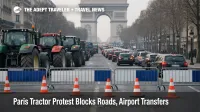
Sydney CBD Protest March Ban Disrupts Airport Transfers
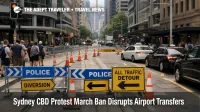
France Farmer Roadblocks Hit Motorways And Toll Exits

December 2 France Budget Strike Hits Paris Transport
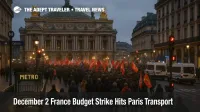
France strikes and protests: What travelers should expect
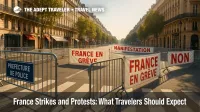
Paris protests and ATC strike: traveler advisory
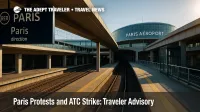
France Protests Travel Advisory after September 10
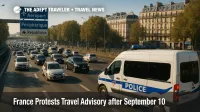
France protests recap: what happened on the ground and what travelers should expect next

France "Bloquons tout" protests disrupt roads, rail hubs, and airport transfers
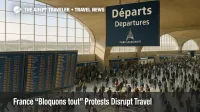
France travel disruptions after government collapse
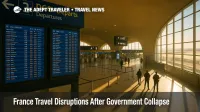
France nationwide protests Sept 10, inter-union Sept 18
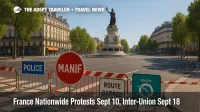
May Day Weekend Travel Disruptions Expected Due to French Protests and UK Border Force Strike

United Airlines Expansion, Disney World Annual Passes & France Travel Advisory

France Travel Advisory: Navigating Nationwide Protests and Strikes in 2023

